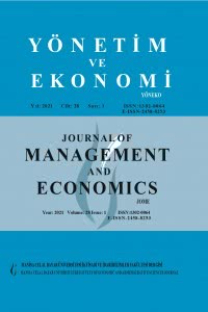Ethical Issues in Doing Business in China
Çin'de İş Yapmanın Etik Sorunları
___
- 1. CHINA LABOR WATCH, Do you believe that Chinese Labor Laws can protect labor rights, http://www.chinalaborwatch.org/en/web/index.php (February 19, 2006)
- 2. COUNTRY WATCH, China: UNDP Human Development, http://countrywatch.school.aol.com (February 18, 2006)
- 3. COUZIN, Odilon (Oct 7, 1999), “China: The People's Republic at 50: Little money, no benefits”, Far Eastern Economic Review, pp. 59
- 4. FOX, Jeremy B., Donohue, Joan M., Wu, Jinpei (2005), “Beyond the Image of Foreign Direct Investment in China: Where ethics meets public relations”, Journal of Business Ethics, pp. 317-324
- 5. GLOBAL BUSINESS POLICY COUNCIL, FDI Confidence Index, December 2005
- 6. HILL, Charles W. L., Ethics in International Business, http://highered.mcgraw-hill.com/sites/dl/free/0072873957/121268/ethics_in_international_business.pdf (February 18, 2006)
- 7. HILL, Charles W. L. (2005), International Business: Competing in the Global Marketplace, 5th edition, McGraw-Hill Irwin, New York
- 8. MARKEL, Douglas C. (Nov/Dec 1994), “Finally, a national labor law”, The China Business Review, pp. 46
- 9. THE TAIPEI TIMES (FEB 5, 2005), “Poor working conditions plague Guangdong”, pp. 9
- 10.UNITED NATIONS DEVELOPMENT PROGRAM, Human Development Report, 2005
- 11.WIKIPEDIA, International Labor Organization, http://en.wikipedia.org/wiki/International_Labour_Organization (February 19, 2005)
- 12.WIKIPEDIA, SA8000, http://en.wikipedia.org/wiki/SA8000 (February 19, 2005)
- 13.YIN, Eden, Choi, Chong Ju (2005), “The Globalization Myth: The Case of China”, Management International Review, pp. 103
- ISSN: 1302-0064
- Yayın Aralığı: Yılda 4 Sayı
- Yayıncı: Manisa Celal Bayar Üniversitesi İktisadi ve İdari Bilimler Fakültesi
Çin’de İş Yapmanın Etik Sorunları
Veli KARGI, Serkan ADA, H. Yasemin ÖZUĞURLU
Kurumların Başarısında Duygusal Zekanın Rolü ve Önemi
Selim KILIÇ, Selen DOĞAN, Özge DEMİRAL
Konut Finansman Modeli Olarak Yapı Tasarruf Sandıkları; Almanya ve Türkiye’deki Uygulamaları
Semra ÖNCÜ, Selim KILIÇ, Rabia AKTAŞ
Selen DOĞAN, Ramazan ARSLAN, Özge DEMİRAL, Mustafa HOTAMIŞLI
Konut Finansman Modeli Olarak Yapı Tasarruf Sandıkları; Almanya ve Türkiye'deki Uygulamaları
Kamu Üniversiteleri Öğretim Elemanlarının İş Tatmini Düzeyini Etkileyen Faktörler
Filiz KARAMAN, Ali Ender ALTUNOĞLU
Avrupa Merkez Bankası ile TCMB'nin Bağımsızlıklarının Karşılaştırılması ve Ekonomiye Etkileri
Avrupa Merkez Bankası ile TCMB’nin Bağımsızlıklarının Karşılaştırılması ve Ekonomiye Etkileri
Yeniden Yapılandırma Döneminde Türk Bankacılık Sektöründe Verimlilik Değişimi
